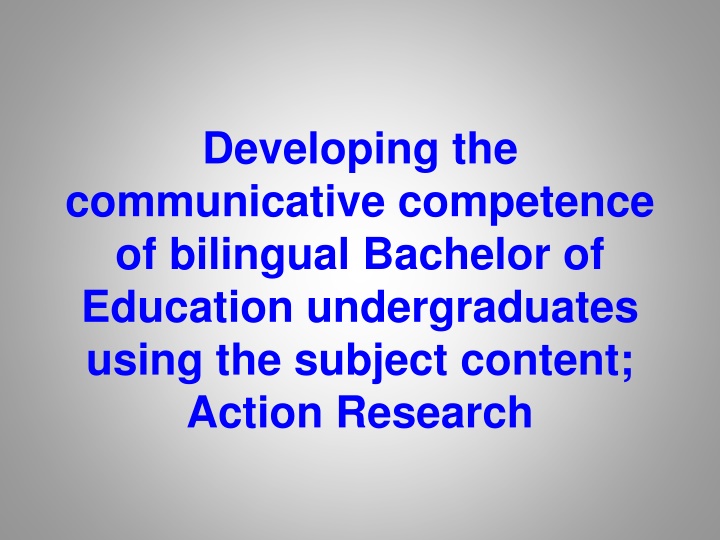
Developing Communicative Competence in Bilingual Bachelor of Education Students Through Action Research
Enhancing English communication skills among B.Ed. undergraduates is crucial for their employability. This action research project aims to identify and address communication challenges through subject content, focusing on Basic Interpersonal Communication Skills (BICS) and Cognitive Academic Language Proficiency (CALP). By implementing interventions over 8 weeks, the study involves activities like dialogues, group discussions, and role-playing to improve students' speaking skills. Findings show students' reluctance to speak, grammatical errors, and ineffective questioning structures.
Download Presentation

Please find below an Image/Link to download the presentation.
The content on the website is provided AS IS for your information and personal use only. It may not be sold, licensed, or shared on other websites without obtaining consent from the author. If you encounter any issues during the download, it is possible that the publisher has removed the file from their server.
You are allowed to download the files provided on this website for personal or commercial use, subject to the condition that they are used lawfully. All files are the property of their respective owners.
The content on the website is provided AS IS for your information and personal use only. It may not be sold, licensed, or shared on other websites without obtaining consent from the author.
E N D
Presentation Transcript
Developing the communicative competence of bilingual Bachelor of Education undergraduates using the subject content; Action Research
Background Lack of English Communication skills one main reason for graduate unemployment ( Perera, Silva, & Marambe, B. 2009) BME introduced in schools in 2001 prepare students for higher education & employment Important to B.Ed (E/M) students two ways
The Iceberg Theory (Cummins, 2000) Development of BICS & CALPS. Basic Communication Skills & Academic Communication Skills Students not developed BICS BICS & CALPS of B.Ed students should be developed simultaneously Using the subject content is the most suitable
Objectives Identify the problems students face in communication in the second language Examine ways of minimizing the above problems Implement a programme to develop the communicative competence Assess the level of development of the students 1. 2. 3. 4.
Methodology Action Research Interviews, classroom observations Identify Problems students encountered in speaking Intervention (8 weeks) to develop speaking skills Sample B.Ed Part 1 undergraduates
Data Collection - - - - The students recorded their own speech and were encouraged to identify their own errors in speech through reflection. Common errors were discussed at the end. Observations Recordings Reflections Feedback of the students
Activities (based on the content) dialogues group activities asking and answering questions explaining concepts in simple language reporting and narrating expressing preferences and objections group discussions on issues presentations and teaching a small section of the content
Findings Reluctant to speak - fear of making mistakes. All the students made grammatical errors word order, prepositions, conjunctions etc. Did not use appropriate questioning structures Eg. True Education is what?
Inappropriate use of vocabulary Eg. I think the major idea is an Education emerging the innate potentialities Main idea of Education is to draw the .. Education should be create a develop people. Education should contribute to
Common Pronunciation errors - different pronunciations of the same syllable in different contexts Eg. district/diversity - silent letters in words - pour, halves. - consonant clusters recognize pronounced as recoraganize
At the end of the Intervention Ability for self and peer corrections (through reflections) Ask simple questions, give simple, relevant answers accurately. (content based) Explain parts of the content in simple language Confidence to make presentations
Conclusion Using subject content of the undergraduates to develop their communication skills is successful because; Language used in practical, authentic situations motivates the students to use the language meaningfully. Dialogues, group discussions, competitions, explanations and presentations effective in the development of communication skills
References Cummins, J.(2000).Language, power and pedagogy: Bilingual children in the cross fire, by J. Buffalo. NY: Multilingual Matters Ltd. National Education Commission. (2003).Proposals for a national policy framework on general education in Sri Lanka; Envisioning education for a national policy framework. Sri Lanka Common European Framework of Reference for Languages; Learning, teaching assessment. Language policy unit, Strasbourg. Retrived from www.coe.int/lang-CEFR Perera, E.R.K., Silva, G.L.L.P. & Marambe, B. (2009). Development of an outcome based curriculum embedding employability skills, institutional goals and values: a Sri Lankan experience. Country Reports-Enhancement of Graduate Employment. ASAIHL Conference, 20th 22ndMay 2009, Colombo, Sri Lanka. Pp. 19-25
Thank You Sulochana Neranjani Dept. of Humanities Education Faculty of Education Supervisor : Prof. Marie Perera
